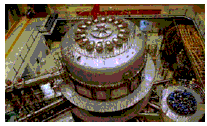据央视国际报道,近日(2006年3月14日摄),中国科学家率先建成了世界上第一个全超导核聚变“人造太阳”实验装置,模拟太阳产生能量。为了达到聚变所要求的温度,需要用电流产生磁场,电流的强度非常大,时间长了,线圈就要发热。从这个角度来说,装置不可能长时间运转。为了解决这个问题,人们把最新的超导技术引入到该装置中。
虽然“人造太阳”的奇观在实验室中已经出现,但“人造太阳”所发出的电能在短时间内还不可能进入人们的家中。根据目前世界各国的研究状况,这一梦想最快有可能在50年后实现。
“人造太阳”的实验研究具有十分重大的战略意义。在过去的100年中,人类对能源的研究和使用已从化石燃料的单一化结构,发展到以化石能源为主,核能和水能互补的多元格局。但是,石油、煤炭等化石能源不可再生,目前已经商业化的核裂变能又会产生一定的核废料,同时受到原料的限制。
而核聚变能则被认为是无限、清洁、安全的换代新能源。据专家介绍,自然界最容易实现的聚变反应是氢的同位素——氘和氚的聚变。氘在地球的海水中藏量丰富,多达40万亿吨,如果全部用于聚变反应,释放出的能量足够人类使用几百亿年,而且反应产物是无放射性污染的氦。这就是为什么世界各国,尤其是发达国家不遗余力,竞相研究、开发核聚能的原因所在。

问:
(1)在“人造太阳”中,为什么要用到超导材料?
(2)这个装置和氢弹的原理有何相同点和不同点?
(3)核聚变的优势有哪些?(写出两点)
(1)用超导材料导线不会发热,电流可以很大,设备也可以长时间运行。
(2)相同点:都是核聚变;不同点:氢弹是不可控聚变,“人造太阳”是可控聚变。
(3)清洁,无污染;原料含量丰富。
